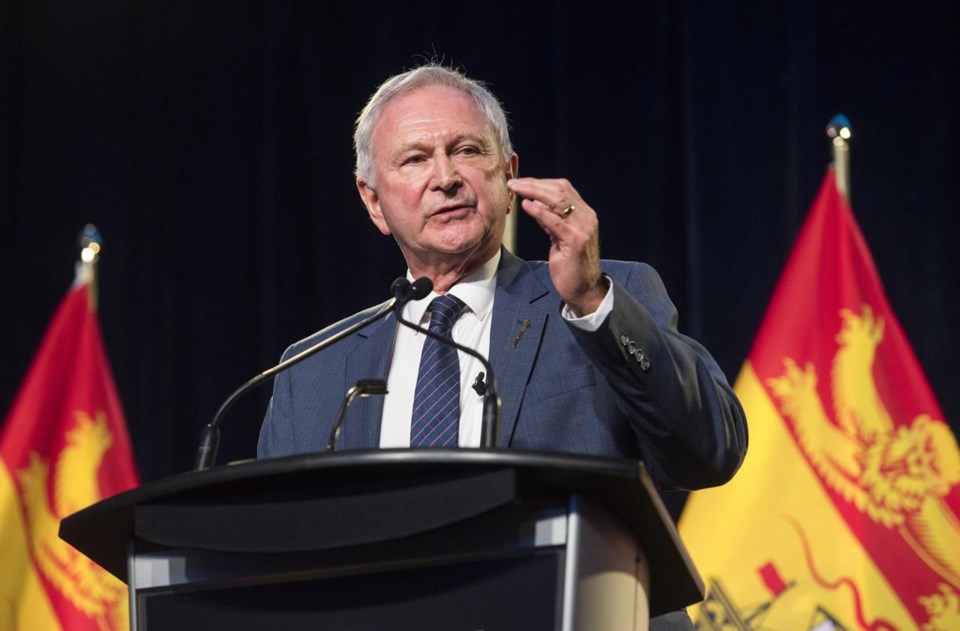FREDERICTON — New Brunswick's Progressive Conservatives are in turmoil, with some members feeling disappointed and angry ahead of the next provincial election, which must be held by the fall.
Last week, the party's general meeting, scheduled for May 24-25, was abruptly cancelled. A party newsletter to members suggested candidates, riding associations and volunteers thought the time and financial resources needed for the meeting were becoming "distracting" from election preparation. New dates have not been decided.
Longtime member Roger Leger, once a party executive, said the Progressive Conservatives are beset by a clash of ideas and values. Progressives who want a smaller government and lower taxes are in conflict, he said, with a wing of the party that is socially conservative and increasingly right-wing.
In 2016, the 77-year-old was among the Progressive Conservatives who supported Blaine Higgs's bid to lead the party, but since then the premier has "drifted way too far to the right on many fronts."
"He is also an autocrat; he listens to no one," Leger said. "So that's anti-democratic, and it concerns me and many others."
Higgs did not respond to an interview request about the divisions in his party and the reasons behind the cancellation of the PC general meeting.
A major fracture in the party occurred over Higgs's decision to change the province's policy on gender identity in schools, with the new rules requiring students to get parental consent before teachers can use their preferred names and pronouns. Several members — including cabinet ministers — publicly dissented against Higgs's leadership over the file, leading the premier to the precipice of calling an early election.
The early vote didn't happen, but a wave of resignations did, leaving Higgs scrambling to fill cabinet positions and defending against accusations his party was a sinking ship.
As well, the party has never been able to consolidate support among francophones, who remain wary about a premier who doesn't speak French and who made a politician — Kris Austin — known for his disdain with official bilingualism, minister of public safety.
The government's decision to reform French-language education in anglophone schools sparked outrage, leading Higgs to back down.
Jason Sully, who was the executive assistant for Dorothy Shephard before she resigned in June as health minister, said the mood of the party is one of disappointment. "It's disenfranchising," he said. "I've never seen such a disengaged party."
Sully, 43, said he got his Progressive Conservative party membership when he was in high school but now feels like a "political orphan."
"I still have hope that maybe once we have a new leader, that maybe we can go back to having meaningful party conversations about policy and ideas and moving this province forward. But right now, I don't see that happening."
It's a "bit of a stretch," he said, to say the current iteration of the party is progressive and conservative.
"We've morphed into an ultraconservative party here in New Brunswick."
Nowhere is the party's swerve to the right more apparent, some members say, than with the acclamation in December of Faytene Grasseschi, a Christian conservative, in the riding adjacent to the premier's. Grasseschi, who will run in Hampton-Fundy-St. Martins, has said she was drawn to the party because of its decision to reform the gender policy for trans and nonbinary students.
In response, the Liberals have chosen John Herron, a two-time Progressive Conservative member of Parliament, to challenge Grasseschi in the riding. In his nomination speech May 11, Herron said the PC party "has lost its way. This premier’s choice for the nominee in this riding is perhaps the starkest illustration."
Sully said annual general meetings of the party used to attract hundreds of people but now have just dozens, adding that the lack of enthusiasm will hurt the Tories in the upcoming elections.
Polling released by Narrative Research in late February indicated 66 per cent of residents were dissatisfied with the performance of the government, with the Liberals under leader Susan Holt maintaining a six-point lead in voting intentions — 40 per cent to 34 per cent.
J.P. Lewis, political science professor at the University of New Brunswick, Saint John, agreed with Sully that low morale within the party risks spilling over into the grassroots membership.
"What kind of impact does it have on recruiting volunteers, getting strong candidates, enthusiasm of the base?" he said.
However, Higgs's PCs remain competitive in the election, despite the "level of turmoil." What stands out, Lewis said, is that Higgs has been unable to "fully contain disgruntled members."
"It's a bit unusual because it normally doesn't happen to the party that's in power and competitive."
John Williston, who stepped down last month as regional vice-president of Westmorland Albert, which is part of the greater Moncton area, called the mood of the party "rather subdued."
"I think that there's a deep undercurrent of frustration, you might even say anger."
Herron's nomination in Hampton-Fundy-St. Martins, Williston said, was heavily attended by recent Progressive Conservative board members and other prominent Tories.
"That's just one example of how deeply troubled the party is at this moment .... There's a great number of us in the party who don't even know if we'll be able to actively support the party going into a general election. I mean, I can't imagine a worse situation, or worse scenario."
This report by The Canadian Press was first published May 13, 2024.
Hina Alam, The Canadian Press



